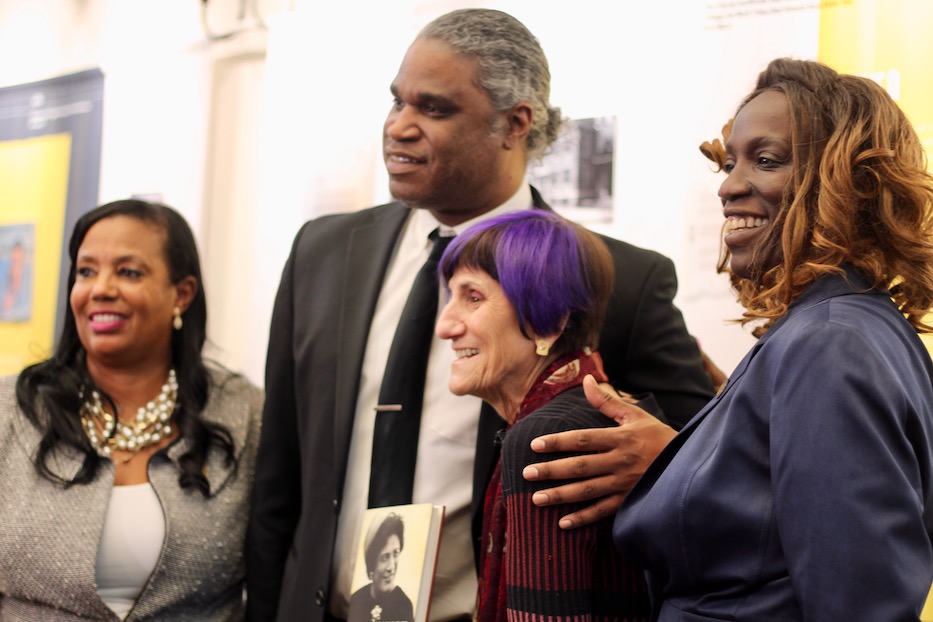
Black History Month | Dixwell | Politics | Arts & Culture | History | Arts & Anti-racism
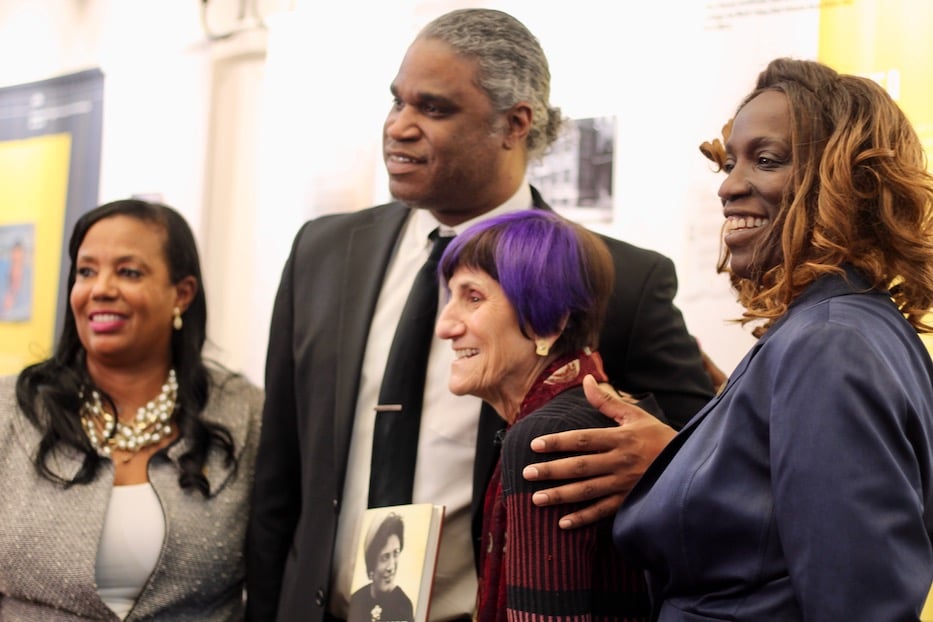
Greater New Haven NAACP President Dori Dumas, Professor Gary Ford, U.S. Rep. Rosa DeLauro, and Dixwell Alder Jeanette Morrison. Lucy Gellman Photos.
It took Dixwell Alder Jeanette Morrison 50 years to learn that Judge Constance Baker Motley—who clerked for Judge Thurgood Marshall, helped launch Brown v. Board of Education, got Martin Luther King, Jr. out of jail more than once, successfully argued nine of ten landmark civil rights cases before the U.S. Supreme Court and became the first Black woman to serve as a federal judge—grew up in the same city, walked the same streets, and attended the same high school that she had.
She never wants another New Havener to have to wait that long to learn that history. If a new act passes in Congress, she'll be one step closer to that goal.
Tuesday morning, Morrison joined city officials, historians, Greater New Haven NAACP President Dori Dumas and local politicos at the Dixwell Community Q House as U.S. Rep. Rosa DeLauro announced plans for the Congressional Tribute to Constance Baker Motley Act of 2022, a piece of legislation that would posthumously honor Motley with a Congressional Gold Medal. Before it is official, it still needs to gain cosponsors and pass by 218 votes in the U.S. House of Representatives and then by 67 votes in the U.S. Senate.
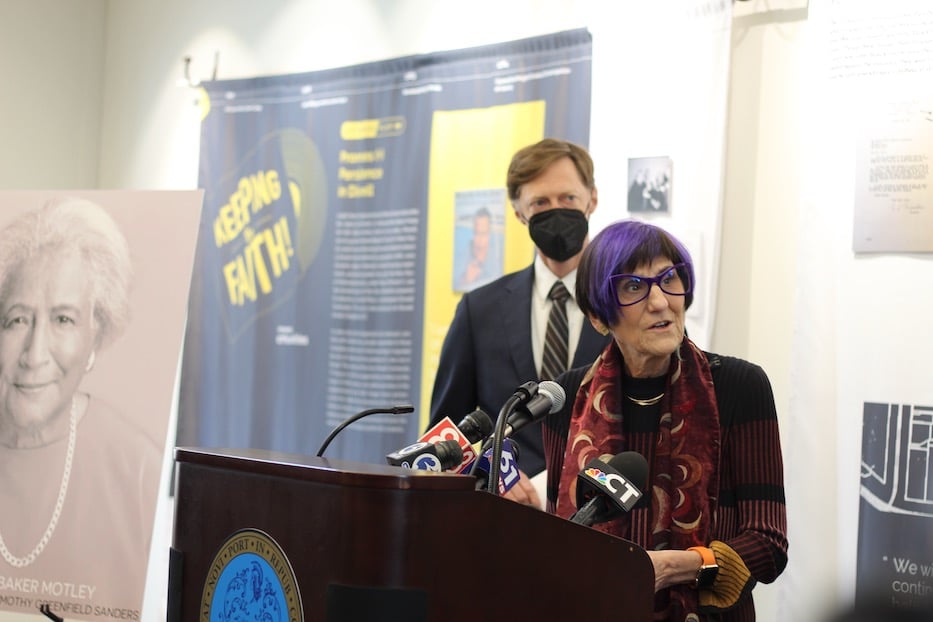
U.S. Rep. Rosa DeLauro at the Q House on Tuesday.
“Driven by her relentless commitment to equality, respect and justice, Constance Baker Motley spent her entire life giving back to her community and country, serving as an exemplary model of leadership and perseverance,” DeLauro said. “So many have been strengthened by her example, and so many lives impacted by her courage, her determination, and her transformative civil rights work.”
Motley, who grew up the daughter of immigrants in New Haven, lived a life of firsts. Her parents were from Nevis, the small island in the West Indies that may best be known for birthing Alexander Hamilton. She spent her early years in the city’s Dwight neighborhood, in a Garden Street home where a stop on the Connecticut Freedom Trail now stands in her honor. As a child, she attended St. Luke’s Church with her parents and 11 siblings, part of a vibrant Caribbean and West Indian community that still thrives in the city today. It was in New Haven, DeLauro reminded an animated room, that Motley first discovered the works of James Weldon Johnson and W.E.B. DuBois, whose words helped catapult her into a lifelong dedication to civil rights.
During her time at James Hillhouse High School, Motley served as president of the New Haven Negro Youth Council and secretary of the New Haven Adult Community Council. By the time she graduated from Hillhouse in 1939, she knew she wanted to practice law, but also could not afford the cost of higher education. Instead, she worked for the National Youth Administration, a product of President Franklin Roosevelt’s New Deal legislation meant to keep young people working through the great depression. In her autobiography Equal Justice Under Law, she wrote about the sewing and chair restoration that she would do for $50 a month during that time.

Mayor Justin Elicker tied Motley's legacy to the reopened Q House. "This building is something that allows many many more Judge Motleys to be in the future," he said. "Judge Motley, while she assuredly was intrepid and overcame adversity, I'm sure she did not do that alone. She was surrounded by many other people who helped support her, just like what is going to happen in this building."
It was in those years that she also met Clarence Blakeslee, a white man who was the former president of the then-nascent Dixwell Community House. In late 1940, she recalled in her autobiography, Blakeslee invited her to a meeting of the space, which at the time was helmed by Yale-affiliated people and struggling to attract Black members of the surrounding community.
When asked to weigh in, Motley evidently spoke her mind—that Black community members weren’t interested in attending a space over which they had no sense of ownership, and were never asked for input. Blakeslee, moved by what she had to say, became her private benefactor and sent her to college, then to law school. Tuesday, that interaction seemed to come full circle in the newly christened Tony and Wendell C. Harp Historical Museum, a second-floor collection of Q House history curated by historian Frank W. Mitchell. On a back wall, Motley’s words beckon in big, clear white letters on a sunshine-yellow fabric backdrop:
We will not be leaving racism behind as we enter the twenty-first century. The question, therefore, is clear. What do we do about it? The answer can be found only in the history of what we have done about racism in this century.
Motley shattered ceilings everywhere she went. From Fisk University, she headed to New York University, and then to Columbia University Law School, where she became the first Black woman to attend and later to graduate from the school. Following college, she was the only woman to work for the NAACP Legal Defense Fund for two decades (a cry of “yes indeed!” went up from attendees at that fact). She went on to successfully fight for integrated schools, represented King in prison, and later secured the right of female journalists to enter and report on male locker rooms.
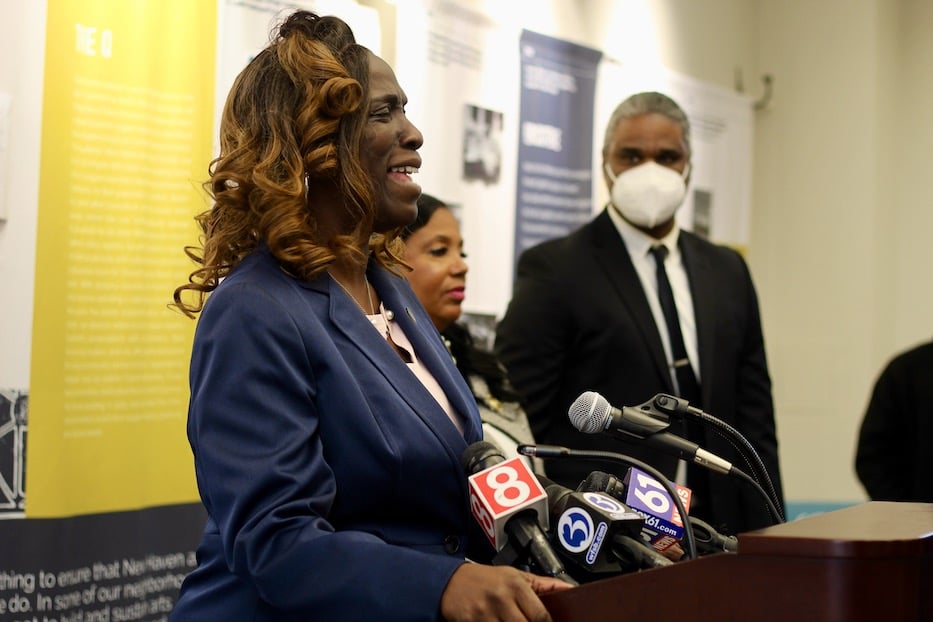
Dixwell Alder Jeanette Morrison.
From the Legal Defense Fund, Motley went on to the New York State Senate, became president of the Borough of Manhattan, and then became the first Black woman to serve as a federal judge in the 1990s. Over a quarter of a century later, she remains one of 70 Black women to have held that position, according to data from the Federal Judicial Center. That's two percent of all appointees.
And yet, she faced discrimination as both a Black person and a woman everywhere she went. Dr. Gary Ford, a Columbia Law School graduate and professor in the Department of Africana Studies at CUNY-Lehman College, recalled how Motley sometimes got into spaces only by insisting she was a secretary, because “that’s the only way they could get her into the building for judges’ meetings.” In one New York club, she had to sneak through a separate entrance to get to after-hours meetings beyond the second floor.
Ford turned the press conference into a vital civics lesson, often drawing knowing Mmm hmms from a full room. Taking the mic, he reminded attendees that “the vast majority of people that she represented have already been recognized,” from University of Mississippi student James Meredith to King. While it is Marshall’s name that is often remembered for Brown v. Board of Education, it was Motley who filed the original complaint that launched the case.
Ford pointed to the fact that Black women, from Motley to Jo Ann Gibson Robinson to Claudette Colvin are often forgotten by history. Books like his 2017 Constance Baker Motley: One Woman’s Fight for Civil Rights and Equal Justice Under Law, as well as Tomiko Brown-Nagin’s recent Civil Rights Queen: Constance Baker Motley and the Struggle for Equality seek to right those omissions from the historical record.
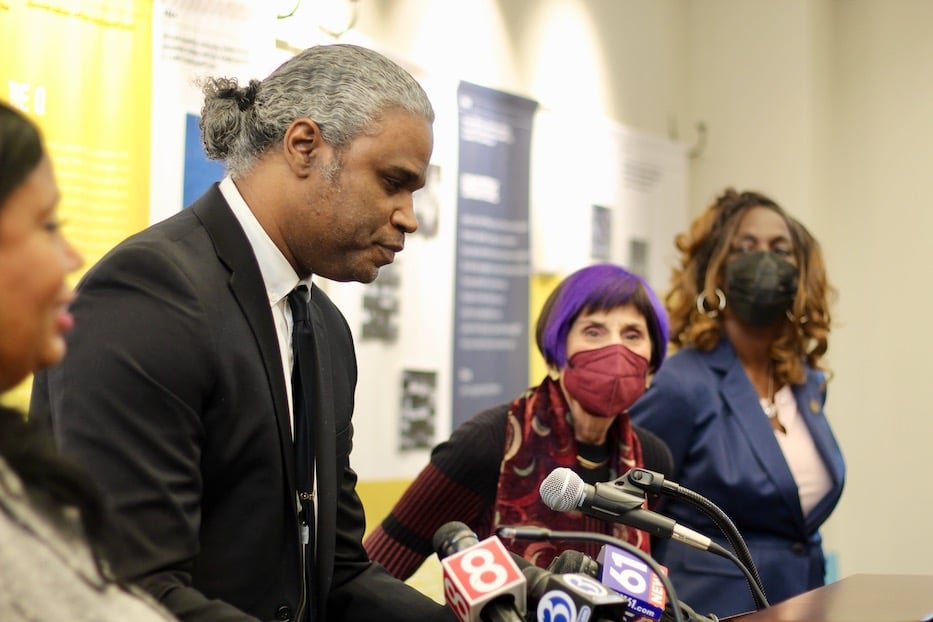
"We have a reckoning now with history, where we’re going to do our best to have a more inclusive historical narrative."
“When we talk about Black History Month, when we talk about some of the key figures—[there are] names that come up all the time,” he said. “Right? But there are other leaders who do not get the recognition they deserve … we have a reckoning now with history, where we’re going to do our best to have a more inclusive historical narrative and talk about different types of leadership. Not just men in the clergy, but women who were doing things a little differently because they had to do things a little differently.”
New Haveners have Ford to thank in part for the proposed legislation. Several years ago, he made the same ask to U.S. Sen. Richard Blumenthal, who unsuccessfully brought it before the Republican-controlled 113th Congress. Then last year, on the centennial of Motley’s birth in New Haven, he and living members of Motley’s family made the appeal again. DeLauro enthusiastically took it on. For Ford, the child of two lawyers, brother of a lawyer, and lawyer himself, the history is personal. He had the chance to meet Motley as a child. He now calls her one of his personal role models.
“I remember hearing her stories about all the people she represented,” he said. “And then later on, in high school and college when I started to study African-American History, I began to realize that the historical record did not have certain names in it. And Constance Baker Motley was the most prominent name that I can think of that just wasn’t there.”
Ford said he is hopeful that the Congressional outcome will be different this time around; he called himself an optimist in an interview after the press conference. He has reason to be: his mother is Professor Marilyn Ford, one of the founders of Quinnipiac Law School. She’s a New Havener who both sits on Motley’s shoulders, and has helped blaze a path for generations of legal practitioners who will follow in her footsteps. Before leaving, Ford promised Morrison 25 copies of his book for the Q House, and a lecture for the young people who use it.
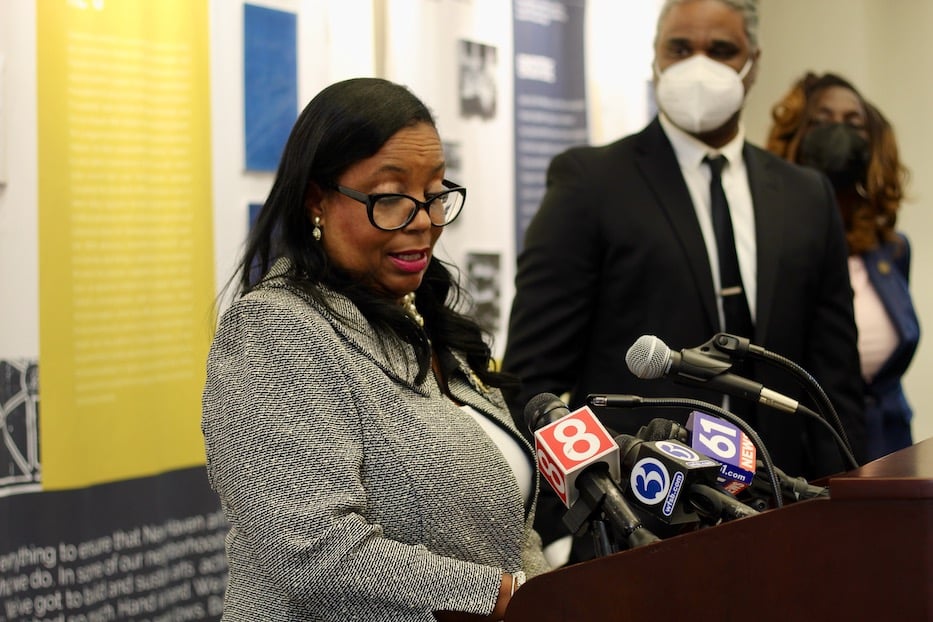
Greater New Haven NAACP President Dori Dumas. "Constance Baker Motley showed us the power the law has to effect change,” Dumas said.
Morrison, who began her career in New Haven’s public schools, said she too is optimistic for the legislation, and ready to help DeLauro in any way she is able. Growing up, she never heard Motley’s name—not even during her time as a student at James Hillhouse High School. In fact, she said, it wasn’t until she was 50 years old and working on the reopening of the Q House that Motley’s extraordinary history came up. She was floored.
“It’s a shame” that it took that long, she said—but younger New Haveners don’t have to suffer from the same erasure that she did. When sculptor Dana King installed a statue of William Lanson on the Farmington Canal two years ago, Morrison recalled learning about exactly three Black people in school (“We learned that Harriet Tubman freed the slaves, that Martin Luther King was a good man, and that Malcom X was a bad man. Which is a lie,” she said at the time). Motley wasn’t one of them. Now, she hopes to help shift the narrative.
"This is what this building is about," she said, motioning to the wood paneling and large windows around her. "I am so honored to be the person to help, to be like a guiding light, to create, recreate this building, because the concept, the legacy still lives on. It never dies. I would have never thought in a million years that I would be a part of this."
"Rosa, I have to say, thank you for looking out for your homegirl," she added with a smile.
She is far from alone. Dumas, now president of the Greater New Haven NAACP, said that knowing Motley attended the same high school, went to the same church as her grandparents, worked for the NAACP Legal Defense Fund, and was an honorary member of Alpha Kappa Alpha Sorority, Incorporated makes her feel "a special sense of connection" to this Black trailblazer who shared and loved New Haven as much as she does.
"Constance Baker Motley showed us the power the law has to effect change,” Dumas said. “She taught us to see and to utilize, if we use the law effectively and fairly, that we too can see real progress and change in our communities."
In a corner of the room, Morrison’s mother, Betty Morrison, soaked in every word. Born and raised in the tiny riverside town of Mullens, West Virginia, Morrison remembered seeing de facto segregation “as a way of life” as a child. In the mornings, she and fellow students drove past a white school up a hill to their smaller, segregated Black school. Her graduating class had just 12 people in it. After high school, she and her mother moved to Moodus, Connecticut for a few years. She was 23 when she resettled in New Haven, which she had seen from the train and "thought it would be a nice place to raise a family."
It was. While she raised a family in New Haven, she never learned about Motley’s life and legacy. She’d heard the name from time to time, she said—but “I never knew the history.” It wasn’t until she and her daughter were talking about the Congressional Tribute that she realized she wanted to learn more.
“I am so glad I came because I learned so much about her,” she said. “It speaks volumes. There are so many women, but I’m going to say especially African-American women, that are exceptional. We are not told we are exceptional. We do not even believe we are exceptional. To be recognized finally is overdue.”

